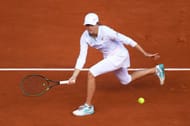A few days ago, the medical timeout was a big topic of discussion in the tennis world. Novak Djokovic didn't technically take one in his quarterfinal match against Pablo Carreno Busta, but just the threat of it was enough to prompt thinly veiled accusations, passionate rebuttals, and a whole lot of unpleasantness.
On Saturday in the Roland Garros women's final, Sofia Kenin went a step further than Djokovic. She actually took a medical timeout in the second set, while trailing 4-6, 1-2, which made many wonder whether her opponent - the 19-year-old Iga Swiatek - would lose her rhythm and stumble just before the finish line.
But in retrospect, that was not a moment to fear the future; instead, it was a moment to remember the past. Or the recent past anyway.
In six previous matches at this year's French Open, Iga Swiatek had taken everything her opponents had thrown at her, and returned it with interest. She had outhit, out-defended and plain outplayed everyone - including overwhelming tournament favorite Simona Halep - in a manner that suggested nothing could possibly faze her. So why would a silly old medical timeout be any different?
The next 15 minutes showed us exactly why there was no reason to fear the effect of any interruption (which was nearly eight minutes long in this case) on Swiatek's play. If anything, she seemed to start hitting the ball bigger after the break.
While Kenin looked out of ideas and short of inspiration, Swiatek simply put her head down and went about her business - which was basically smacking winners left, right and centre - with renewed vigor. And just like that, what had seemed like a cagey battle quickly turned into a blowout.
Practically sprinting towards the finish line, Iga Swiatek didn't lose a single game after Sofia Kenin's medical timeout. The final scoreline - 6-4, 6-1 - sounded quite similar to the teenager's previous crushing wins, which none of us thought was possible before the start of the match.
Iga Swiatek and her instinctive brand of tennis

Did Iga Swiatek know how much of an underdog she was throughout this fortnight in Paris? It's hard to tell whether she knows anything other than hitting the ball on the court.
Swiatek has the clueless, carefree air of someone who is decidedly not accustomed to being in the public eye. Her cap always shields half her face, her arms and legs are constantly going all over the place, and many of her conversations consist almost entirely of fangirling over Rafael Nadal.
When she is hunched forward at the baseline, waiting to return serve, the Pole could easily be mistaken for a kid in a playground wiling away her time between classes - which, incidentally, she was planning to continue taking if her tennis exploits went south.
That innocent cluelessness was still visible even after she had won the highest accolade you can possibly win in the sport. When she struck one last forehand winner to wrap up the final, Swiatek reacted like a five-year-old would at being given a new toy: with pure, unfettered abandon.
She bounced up and down, flashed the widest smile anyone has ever seen on Court Philippe Chatrier, and proceeded to climb all the way up to her player box to celebrate with her team (does that remind you of someone?).

The Pole carried the same childlike air throughout the victory speech and trophy presentation, and ended it with a genuine "Should I say something else?"
The exuberance of youth, some would say. And Iga Swiatek's game too has the all the qualities you would normally associate with youth: it is explosive, raw, temperamental, and most importantly, totally free.
Swiatek can overpower anyone from the baseline, but she can also bomb forward and finish points at the net with deft volleys. Her game is built on instinct; she does whatever she thinks is the right play in the moment, irrespective of the tempo or momentum in the rally. And that's not a bad strategy when you are as naturally gifted as Swiatek.
Her forehand has an elaborate, roundhouse swing that reminds many of Nadal's, but Swiatek is not as obsessed with spin or patterns as her idol. Swiatek doesn't prefer any one direction on her biggest weapon, the way Nadal does with the crosscourt forehand, and instead she looks to flatten it out at the slightest of openings.
The Pole's backhand is more in the mold of modern-day baseline sluggers, but even on that shot she can generate some serious pace. Swiatek's average forehand and backhand speeds were comparable to those of the biggest hitters in the men's tournament, which perhaps explains why she could reduce a player as good as Simona Halep to a spectator for a majority of their match.
But offense is not the only thing Iga Swiatek is good at. On Saturday, the Pole stole several points from right out of Kenin's grasp by doing nothing other than scrambling blindly to extend the point. When you can do that and also belt winners for fun, you're going to be a tough opponent for anyone in the world.
Jelena Ostapenko, Bianca Andreescu and now Iga Swiatek - the tradition of teenagers winning Slams is alive and well

It is tempting to draw parallels between Iga Swiatek's win and Jelena Ostapenko's similarly out-of-the-blue triumph at the 2017 French Open. But in truth, the Pole's campaign bears more similarities to Bianca Andreescu's at last year's US Open.
Like Andreescu, Swiatek can do many different things in a rally on command. She can change direction effortlessly, mix up her spins whenever required, unfurl drop shots out of nowhere, and pull off reflex winners that could put Roger Federer to shame.
The Pole may not be as quick-footed as Andreescu or blessed with as reliable a serve, but when it comes to taking the racquet out of the opponent's hands through eclectic brilliance, the two youngsters are cut out of the same cloth.
The lack of nerves that Swiatek showed in the final was also reminiscent of the Canadian. While Sofia Kenin is no Serena Williams, Swiatek was pitted against a proven champion in the biggest match of her career. But just like Andreescu, the Pole played the match like it was her 30th Slam final rather than her first.
Iga Swiatek dropped just 28 games across seven matches this year, which is the second fewest that any Roland Garros champion has ever dropped (behind Steffi Graf's 20 from that crazy 1988 run). She is the first ever singles Slam champion from Poland, but would even the most patriotic of Poles have imagined the landmark would be achieved in such stunning fashion?
Swiatek had never won a tour title before this week. And apart from her fourth-round appearances at Roland Garros and Melbourne in the last one year, she had mostly flown under the radar in her senior career. While other teenagers like Coco Gauff, Amanda Anisimova and of course Andreescu made headlines and inspired "Who's going to be the next dominant WTA star?" conversations, Swiatek kept a low profile and focused on juggling her school with her tennis.
That, needless to say, is going to change now. By winning the French Open in the way that she did, Iga Swiatek has become one of its youngest as well as one of its most dominant champions ever. The last time a woman won Roland Garros without dropping a set was all the back in 2007 (Justine Henin), and the last time a teenager won Roland Garros was not even in the current century (Iva Majoli, 1997).
As fans we are often cautioned not to immediately make grand predictions whenever a teenager wins something big. And it's true that not all of those predictions come good, as Jelena Ostapenko keeps reminding us with every 40-error loss she racks up. But it is tough to imagine Iga Swiatek completely falling off the rails and fading away into oblivion; she's just got too much game for that.
She also probably has too much mental fortitude for that. If even suspicious medical timeouts from her opponents couldn't faze her, then what can?
